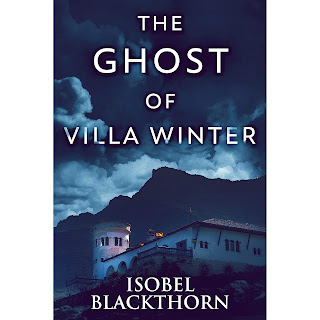What Happened At The Abbey (The Straithbairn Trilogy) Book One by Isobel Blackthorn; Blackthorn Goes Gothic in Engaging Historical Murder Mystery
By Julie Sara Porter
Bookworm Reviews
Spoilers: Isobel Blackthorn is a favorite author of the blog. She is one of the best recent mystery/suspense authors. Her attention to setting and character brings new light to the Cozy Mystery, Locked Room Case, and other subgenres. Her books, The Cabin Sessions and Emma's Tapestry were favorites on the Best of the Best Year End Lists of 2021 and 2022 respectively. So when I say that What Happened At The Abbey, the first in Blackthorn's The Straithbairn Trilogy is the best of Blackthorn's work, I mean that it is the best of quite an impressive collection indeed.
What Happened at the Abbey is a loving tribute to the Gothic Mystery with an innocent female protagonist hired to work at a creepy wealthy estate for an eccentric family and unearths a secret that the family or their antecedents are trying to hide. It is a wonderful subgenre already and a personal favorite but Blackthorn's attention to tone and character make this a great addition to the genre and a stellar work in its own right.
Ingrid Barker is escaping an abusive marriage with her daughter, Susan. She had to leave her upper middle class lifestyle behind and travel North to Scotland to accept the position of housekeeper at Straithbairn Abbey. As she adjusts to her new surroundings and life as a single mother, Ingrid gets to know her employers, the McLeod Family particularly the argumentative daughter, Gertrude and the feckless secretive son, Miles. Miles in particular arouses suspicion with his cryptic words, his habit of sneaking around outside at night, and family's apparent dislike of him. It becomes clear that something is creepy in the estate of Straithbairn. Meanwhile, Ingrid is receiving threats of her own as she learns that her abusive ex husband is hot on her trail.
The atmosphere is one of stern judgment and deep ominous potentially demonic energy. Ingrid personifies Straithbairn as a “house that seems to frown down on all who behold it.” It's described with rugged countryside, omnipresent sharp craggy stones, a dour facade, and no softness. It is cold, imposing, and already unloving.
The people who dwell inside Straithbairn are just as dysfunctional as the location that surrounds them. The McCleods are people who share a last name but harbor no illusions that they love each other or consider themselves family. Charles, their father, has a tight psychological grip on his children. Gertrude cares more about the estate than she does for the people who live inside it. Blake loses himself in alcohol and defeatism.
Then there's Miles whose arrival instantly brings derision and anger from the rest of his family. He is the McLeod Family Outsider. He appears at Straithbairn to collect moss for an academic study. But his first person narrative (which he alternates with Ingrid’s point of view) reveals more about him than he tells others.
Miles is haunted by his family history and is searching for some answers to questions that have dogged him for years. His narration suggests him as someone who is teetering on the edge of sanity. He alternates between trying to retain rational thought and drifting towards paranoid delusions and fantasies. With the potentially supernatural atmosphere that charges the air, there are moments where it is uncertain if Miles is going insane or actually possessed by demons. What is apparent is that Miles is a man who is inwardly suffering and has no support from the people around him leading to further suffering.
The tension is also experienced by Ingrid. For someone who survived a physically and emotionally abusive marriage, Ingrid no doubt personifies her own experience with the setting around her. Her Anxiety and PTSD is paramount as well as her desire to get away from her previous situation. Straithbairn reminds her of her marriage: intimidating, isolated, domineering, confining, and loveless.
Ingrid is also someone whose own nerves are naturally at an all-time high. She shows a tremendous amount of strength of character by pulling herself and Susan out of a bad situation and starting over in another country by telling people that she is a widow. However, she shows obvious signs of PTSD and Generalized Anxiety Disorder. She is suspicious of the bond that develops between Susan and Ethel, the cook. She finds a newcomer, Hamish, to be alternatively attractive and mysterious. Then there is the news of Edward's return which causes her to fear the world inside and outside the estate.
The tension in the air consumes Ingrid and it becomes clear that something terrifying is hiding in the fringes or under the surface and is about to happen.
It breaks when Ingrid and Miles come face to face with their own fears, anxieties, insecurities, and paranoia and those that cause them.




